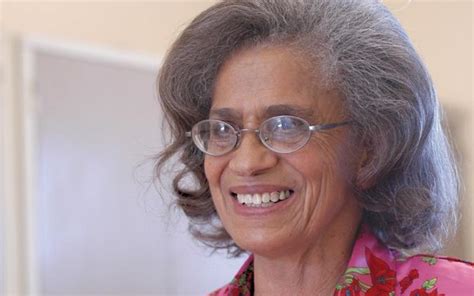
“I will rest the day I die” used to say Ottilie Abrahams. For sure, this brilliant woman has been very active her whole life…
Ottilie Abrahams was born in the Old Location, in Windhoek, in 1937. She has always been passionate about education. For the people in her neighbourhood, getting a degree was something exceptional. Therefore, she said she went to university to show that “black people can achieve things, and also that a woman can achieve anything she really wants to achieve”.
She attended high school and university in Cape Town. During the 1950’s, she was a member of various organisations such as the South West African Student Body or the Non-European Unity Movement. In addition, she helped to raise funds for the studies of young Namibians and to create the first black newspaper, South West News. Finally, in 1962, she joined the Yu Chi Chan Club (which means guerrilla warfare in Chinese). It was a secret Maoist anti-apartheid organization preparing for the armed struggle against the South African government.
Ottilie Abrahams was one of the few, if not the only, woman in the leadership of those organizations. In fact, she was one of the small handful of Namibian women in exile.
When the Yu Chi Chan Club was uncovered, she and her husband Kenneth Abrahams returned to South West Africa and established the Rehoboth branch of SWAPO. She became Secretary for education in the SWAPO Executive Committee. However, the couple and other activists were expelled from the movement during the “Shinganga Rebellion”, as many members started to question undemocratic tendencies and corruption in the leadership. Wanted by the South African authorities in Namibia, the Abrahams fled to Zambia, and then to Sweden, after being held in Zambian prisons.
In 1978, the couple were granted political amnesty, returned to Namibia, and founded the SWAPO Democrats party, at a time where the South African administration was trying to find an ‘internal settlement’ to the ‘South West African’ problem. Ottilie Abrahams however left the SWAPO Democrats in 1980. She later joined the Namibia Independence Party, which was part of the Namibia National Front coalition (NNF), an alliance of moderate nationalist parties.
While being a member of these political organizations, she also participated in the founding of the Namibian Women’s Association (NAWA) in 1979. Ottilie Abrahams denounced the violent opposition of men, who sometimes beat their wives who attended NAWA meetings. It was only after the Independence and the Married Persons Equality Act that the association was really able to help women by providing legal advice to women seeking divorce.
In the meantime, Ottilie Abrahams focused on community development and especially on education projects. In 1985, she founded the Jacob Marengo Tutorial College, where she remained principal until her death. Her idea was to teach children critical thinking, participatory democracy and feminism to overcome the effects caused by a long reign of apartheid and patriarchy.
In 1993, Ottilie Abrahams developed the Affirmative Action for the Girl Child Project, which she presented during the 1995 Beijing World Conference on Women. Every holiday, more than 100 girls gather for training in project development and leadership. She also established the Namibian Girl Child Organisation, which has now 186 clubs across the country. Her idea was “to unite girls throughout Namibia, beyond tribalism and party politics, and to get girls involved in the solution of their own problems”.
In conclusion, Ottilie Abrahams was a heroine, a pioneer and a central figure in the women’s movement. However, she was, and we should also be, critical of this movement, claiming that there is too little collaboration between the different associations and not enough involvement of rural women. Women should try to play a greater role in the conduct of public affairs, even if they think they lack qualifications, because “if women commit themselves to a goal, they will be able to move mountains”. For Ottilie Abrahams, the struggle for liberation is thus far from over. In honour of her legacy, it is up to us to carry on her fight…